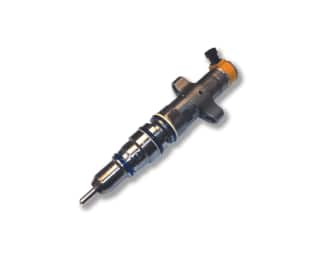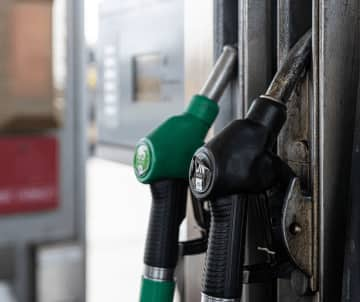Take Control with Fuel Injection Maintenance
Revised September, 2023

Failures to Avoid
The fuel injector plays a significant role in the reliable operation and performance of heavy duty trucks. Fuel injectors deliver precise amounts of fuel into the engine’s combustion chamber, ensuring optimal power output and fuel efficiency.
However, like any mechanical part, fuel injectors are subject to wear and tear. This leads to potential failures that can hamper a truck’s performance and overall efficiency. Equip yourself with the knowledge to keep your heavy duty truck running smoothly.
Fuel Injector Failures: Understanding the Causes
Fuel Contamination:
The single biggest problem fuel injection system manufacturers face is fuel contamination. A few factors heighten this :

- Tolerances: Today’s Common Rail system operates at 30,000+ psi- compared to 15,00 psi just a few years back. Higher pressures tighten tolerances to as low as 2 microns of rotational clearance. This leaves only a thin film of fuel as the sole lubricant for the matched parts.
- Water: With fuel injectors operating within tight tolerances, any water present in the fuel can cause significant issues. Water lowers the boiling point of the fuel and prevents the fuel from acting as a lubricant. This becomes particularly prevalent when fueling over-the-road and neglecting to keep underground tanks at least ¾ full.
The condensation that forms on the inside of the tank turns water droplets that are heavier than fuel. When this occurs, the water droplets go right to the bottom of the tank. This issue also arises when the bulk tank is filled as it mixes with the contents at the bottom of the tank. This can take days to settle out. - North American fuel grade: The minimum Fuel Cetane rating in North America is 40, whereas in Europe, it is 51. The sulfur removal from the fuel (ULSD) in 2005 heightened this already significant difference. The sulfur was a lubricant.
If your customer is not adding lubricant, they are shortening the life of their fuel system. Keep in mind, some Common Rail system shave up to 9 opening and closing cycles in each combustion event. - Other contaminants: Very tight tolerances and very small nozzle opening holes do not mix well with dirty fuel. Filtration is critical (you should be selling and requiring fuel filter changes with installation of injectors or warranty is void).
Particles such as dirt, rust, water, or debris can clog the tiny orifices in the fuel injector, disrupting the fuel spray pattern and hindering proper combustion. Regularly inspecting and cleaning fuel filters, using high-quality fuel additives, and purchasing fuel from reputable sources are effective measures to prevent fuel contamination.
Low Fuel Levels
Running a heavy duty truck with low fuel levels can be detrimental to fuel injectors. Insufficient fuel in the tank increases heat and strain on the injectors as they draw fuel from the bottom, where sediment and contaminants settle.
Air entrained in the fuel changes the boiling point, drastically affecting lubrication. As the entrained air bubbles collapse, it can cause cavitation erosion. This has the same effect as a sand blaster. Maintaining an adequate fuel level ensures that the fuel injector receives a constant supply of clean fuel, reducing the risk of failure.
Precup Issues
Some engines use a soft (sacrificial) precup that is pressed into the head. The injectors seal the precup using O-rings and a copper sealing washer at the bottom. This prevents combustion gases from leaking. Any missing or double stacked copper washers can allow hot combustion gases to enter the cup and cook the O rings.
In CAT and IH HEUI engines, the O rings seal the fuel from engine oil - so a breach can dilute the oil sump with fuel oil. Obviously and O rings cut on installation are also detrimental. Some engines are prone to entrained air in the coolant.
When this air meets the outer surface of the precup, it causes cavitation erosion similar to what occurs in the fuel. As a result, when the precup becomes perforated, coolant can mix with the fuel, leading to severe damage.
Precup problems, such as carbon buildup or fuel leakage, can adversely affect fuel injectors. Carbon deposits inside the precup can restrict fuel flow, resulting in inefficient combustion and reduced performance. Additionally, fuel leakage around the precup can lead to incomplete fuel atomization, causing unburned fuel to enter the exhaust system. Regular maintenance, including precup inspections and cleaning, can mitigate these issues.
DEF (Diesel Exhaust Fluid) Systems
Most engine manufacturers have arrived at SCR (Selective Catalyst Reduction) to reduce harmful emissions. This process entails injecting DEF (32% Urea solution to knock out the NOX) into the exhaust stream, downstream of the turbo, and upstream of the DPF (Diesel Particulate Filter).
These systems are prone to issues with plugging up with carbon/soot because they are in the exhaust stream. When the fuel injectors become plugged, various issues with the sensors and control modules arise, eventually leading to engine shutdown. Systems that have a Diesel Particulate Filter (DPF), but lack Diesel Exhaust Fluid (DEF), burn the trapped exhaust gases in the DPF using diesel fuel, similar to a salamander heater.
Contaminated DEF can cause injector clogging, leading to poor fuel atomization and incomplete combustion. This results in poor mileage and progressively plugged up with each regen. Strictly adhering to DEF quality standards and proper storage practices are vital to preventing injector issues.
Consult the Experts

One common challenge faced by truck owners is selecting the correct fuel injector for their specific truck model. Misconceptions regarding fuel injector compatibility can lead to suboptimal performance and premature failures.
To address this challenge, it’s essential to consult with the Heavy Duty Experts for reliable sources of information. Professional advice and detailed product specifications will help you choose the right fuel injector that matches your truck’s requirements. Experience maximum performance and longevity with the right fuel injector for your specific rig.
Fuel injector failures in heavy duty trucks can result from various causes, such as fuel contamination, low fuel levels, precup issues, and DEF system complications. By understanding these failures and implementing preventative measures, truck owners can avoid costly repairs, optimize fuel efficiency, and enhance overall performance. Always prioritize regular maintenance, use high-quality fuel and DEF, and consult with experts to select the correct fuel injector for your specific truck model.
Stay Ready for the Road Ahead™

At FleetPride, the nation’s largest distributor of truck and trailer parts, we offer a wide range of fuel injectors that meet the highest industry standards. Visit FleetPride.com to explore our extensive catalog. Equip your heavy duty truck with the perfect fuel injector for improved reliability and performance.
Enhance your heavy duty truck’s performance with top-quality fuel injectors from FleetPride.com. Explore our wide selection at FleetPride.com and experience the reliability and efficiency you need for your trucking operations.
*The forgoing is provided for informational purposes only. Please consult your local FleetPride Heavy Duty Experts to verify the suitability of a part for the intended application.


